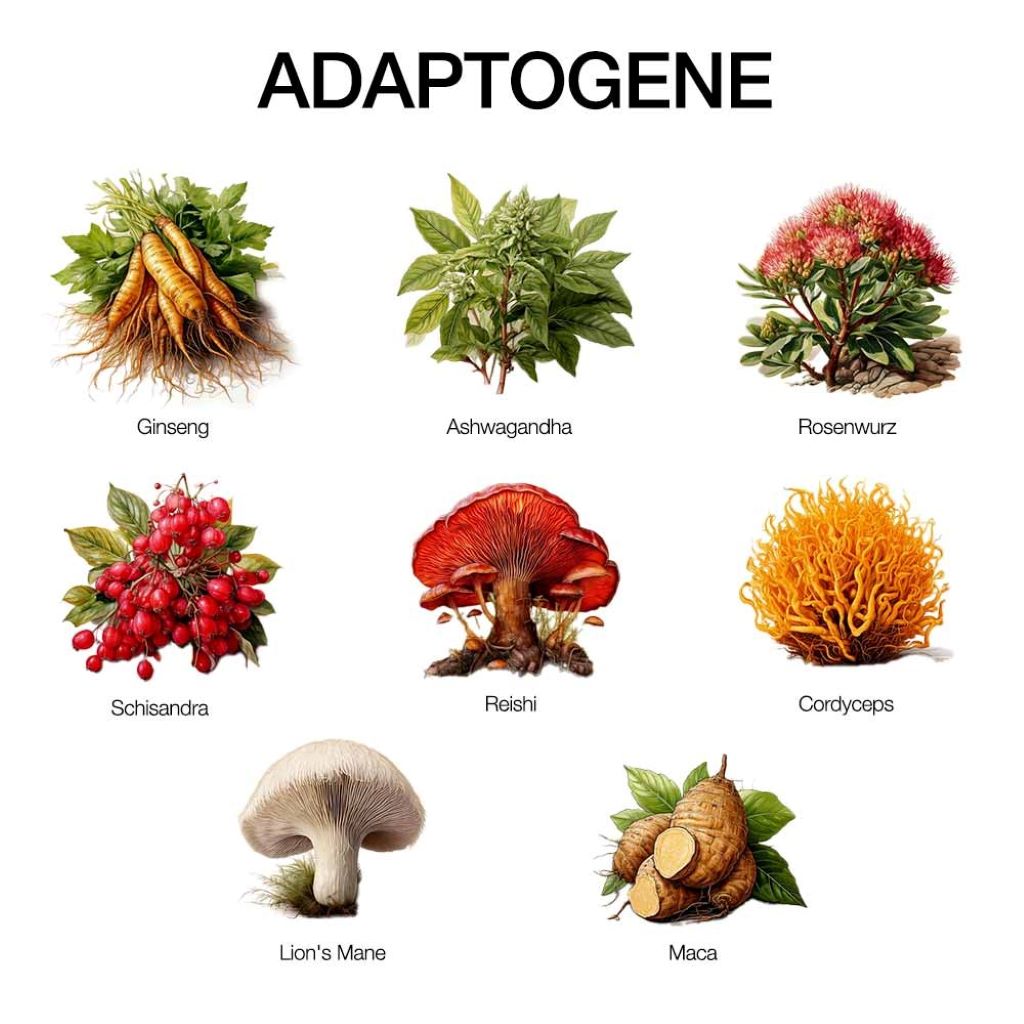
How to Fish for Lake Trout in a Small Lake
November 6, 2025How Often Should Office Blinds Be Cleaned?
November 14, 2025Picture this: you’re rushing through another packed day, juggling work deadlines, family responsibilities, and that endless mental to-do list. Your shoulders are tense, your mind is racing, and you’re reaching for your third cup of coffee before noon. Sound familiar? You’re not alone. In our hyperconnected world, chronic stress has become the unwelcome companion of millions, silently wreaking havoc on our physical and mental well-being.
But what if nature had already provided us with powerful allies in this battle against stress? Enter adaptogens – a remarkable class of herbs and mushrooms that have been quietly supporting human resilience for thousands of years. These botanical powerhouses are now capturing the attention of modern science, offering a natural approach to stress management that works with your body’s own healing mechanisms.
Table of Contents
ToggleWhat Are Adaptogens? Understanding Nature’s Stress Fighters
Adaptogens are a unique category of plants and fungi that help your body adapt to various forms of stress – whether physical, chemical, or biological. The term “adaptogen” was coined by Russian scientist Dr. Nikolai Lazarev in 1947, who defined these substances as agents that increase the body’s resistance to stress while normalizing physiological functions.
To earn the title of “adaptogen,” a substance must meet three specific criteria:
- Non-toxic: Safe for long-term use with minimal side effects
- Non-specific: Provides broad-spectrum support against various stressors
- Normalizing: Helps restore balance to bodily systems, regardless of the direction of imbalance
Think of adaptogens as your body’s personal stress management team. They don’t simply mask symptoms like conventional stimulants or sedatives. Instead, they work intelligently, providing energy when you need it and promoting calm when it’s time to rest.
The Science Behind Adaptogenic Stress Relief
The magic of adaptogens lies in their ability to modulate your hypothalamic-pituitary-adrenal (HPA) axis – your body’s primary stress response system. When you encounter stress, your HPA axis triggers the release of cortisol and other stress hormones. While this response is crucial for short-term survival, chronic activation can lead to fatigue, anxiety, immune suppression, and numerous health complications.
Adaptogens work by:
- Regulating cortisol production: Helping to normalize both elevated and depleted cortisol levels
- Supporting adrenal function: Nourishing the adrenal glands that produce stress hormones
- Enhancing cellular energy: Improving mitochondrial function for better energy production
- Protecting against oxidative stress: Providing antioxidant support to combat stress-induced cellular damage
- Balancing neurotransmitters: Supporting healthy levels of serotonin, dopamine, and GABA
Research published in peer-reviewed journals has demonstrated that regular adaptogen use can significantly reduce perceived stress levels, improve mental performance under pressure, and enhance overall quality of life.
Top Adaptogens for Effective Stress Management
Ashwagandha: The Ultimate Stress Reliever
Ashwagandha (Withania somnifera) stands out as one of the most extensively researched adaptogens for stress relief. This ancient Ayurvedic herb has shown remarkable ability to reduce cortisol levels by up to 30% in clinical studies. Regular ashwagandha supplementation can help improve sleep quality, reduce anxiety, and boost energy levels without the jittery effects of caffeine.
Rhodiola Rosea: The Fatigue Fighter
Known as “golden root,” Rhodiola rosea excels at combating stress-related fatigue and mental exhaustion. This hardy Arctic plant helps improve cognitive function, enhance physical endurance, and reduce burnout symptoms. It’s particularly beneficial for individuals experiencing chronic work-related stress or seasonal affective symptoms.
Holy Basil: The Mood Stabilizer
Holy basil (Ocimum tenuiflorum), also called Tulsi, offers gentle yet effective stress relief with additional mood-balancing properties. This sacred herb in Ayurvedic tradition helps regulate cortisol rhythms, supports healthy blood sugar levels, and promotes emotional equilibrium throughout the day.
Schisandra Berry: The Mental Clarity Enhancer
Schisandra chinensis, known as the “five-flavor fruit,” supports mental clarity and focus while protecting against stress-induced cognitive decline. This adaptogen is particularly valuable for students, professionals, and anyone needing sustained mental performance under pressure.
Reishi Mushroom: The Calming Protector
The “mushroom of immortality,” Reishi (Ganoderma lucidum), offers unique calming properties that promote restful sleep and emotional balance. Unlike stimulating adaptogens, Reishi provides gentle, long-term support for chronic stress recovery and immune system strengthening.

How to Incorporate Adaptogens into Your Daily Routine
Timing and Dosage Considerations
The beauty of adaptogens lies in their flexibility and safety profile. Here are some practical guidelines:
Morning Energy Support: Take stimulating adaptogens like Rhodiola or Schisandra with breakfast to support daytime energy and focus.
Evening Relaxation: Use calming adaptogens like Reishi or Ashwagandha in the evening to promote restful sleep and recovery.
Consistent Daily Use: Most adaptogens work best with consistent daily use over 6-8 weeks, allowing your body to gradually adapt and respond.
Forms and Preparation Methods
Adaptogens are available in various convenient forms:
- Standardized extracts: Concentrated powders or capsules for precise dosing
- Teas and tinctures: Traditional liquid preparations for gentle, sustained effects
- Functional foods: Adaptogen-infused smoothie powders, energy bars, and beverages
- Combination formulas: Synergistic blends targeting specific stress-related concerns
Potential Benefits Beyond Stress Management
While stress relief remains their primary claim to fame, adaptogens offer additional health benefits:
Enhanced Athletic Performance: Many adaptogens improve physical endurance and reduce exercise-induced stress on the body.
Immune System Support: Chronic stress suppresses immune function, and adaptogens help restore immune balance and resilience.
Cognitive Enhancement: Regular adaptogen use may improve memory, focus, and mental processing speed.
Hormonal Balance: Several adaptogens support healthy hormone production and regulation, particularly beneficial during times of hormonal transition.
Cardiovascular Health: By reducing chronic stress, adaptogens indirectly support heart health and healthy blood pressure levels.
Safety Considerations and Precautions
While generally safe for most people, adaptogens do require some consideration:
Medication Interactions: Some adaptogens may interact with prescription medications, particularly blood thinners, diabetes medications, and immunosuppressants.
Pregnancy and Nursing: Pregnant and breastfeeding women should consult healthcare providers before using adaptogenic herbs.
Autoimmune Conditions: Individuals with autoimmune disorders should exercise caution, as some adaptogens may stimulate immune function.
Quality Matters: Choose reputable suppliers who provide third-party testing for purity and potency.
Creating Your Personalized Adaptogen Strategy
The key to successful adaptogen use lies in personalization. Consider your specific stress patterns, lifestyle demands, and health goals when selecting adaptogens. Start with one adaptogen for 2-3 weeks to assess your body’s response before adding others.
Keep a simple journal tracking your energy levels, sleep quality, mood, and stress perception. This information will help you fine-tune your adaptogen protocol and identify which herbs work best for your unique constitution.
The Future of Adaptogenic Medicine
As research continues to unveil the mechanisms behind adaptogenic action, we’re witnessing a renaissance in natural stress management approaches. Modern science is validating what traditional healing systems have known for millennia – that plants possess sophisticated compounds capable of supporting human resilience and vitality.
The integration of adaptogens with lifestyle modifications like regular exercise, adequate sleep, and mindfulness practices creates a comprehensive approach to stress management that addresses root causes rather than merely symptoms.
Take Control of Your Stress Response Today
Chronic stress doesn’t have to be an inevitable part of modern life. By understanding and utilizing the power of adaptogens, you can reclaim your energy, restore your calm, and build lasting resilience against life’s challenges.
Related Topics:
Can you freeze yogurt? Tricks to do it without spoiling



